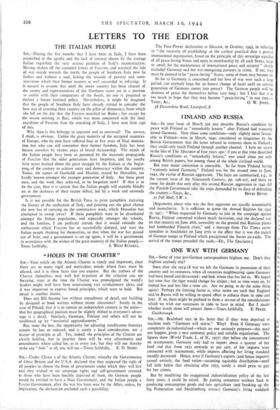"HOLES IN THE CHARTER"
Slit,—Your article on the Atlantic Charter is timely and important, since there are so many rigid and meticulous minds whose fears must be allayed, and it is these fears that you express. But the authors of the Charter themselves may well feel impatient of the criticism you are focusing, since at the time the Charter was promulgated the world's leaders might well have been entertaining vast revolutionary ideas, and it was important to express broad principles, which were to hold. But detail is another matter.
Does any Bill become law without amendment of detail, any building be designed or book written without minor alterations? Surely in the case of Poland, that it is to remain an independent country is the point— that her geographical position must be slightly shifted to everyone's advan- tage is a detail. Similarly, Germany. Finland and others will not be swallowed up by "territorial aggrandisement."
But, none the less, the opportunity for adjusting troublesome frontiers cannot be lost or rejected, and is surely a local consideration, not a matter of principle at all. Yes, indeed, the principles of the Charter are clearly holding, but in practice there will be wise adiustments and amendments where called for, as in every law, but they will not thereby make any " hole " at all, you will see.—Yours faithfully, E. D. SHARP.
SIR,—Under Clause 3 of the Atlantic Charter, whereby the Governments of Great Britain and the U.S.A. declared that they respected the right of all peoples to choose the form of government under which they will live and they wished to see sovereign rights and self-government restored to those who have been forcibly deprived of them, the German people would be entitled to have a Nazi Government, and the Italian people a Fascist Government, after the war has been won by the Allies, unless, by implication, the declaration excluded such .2 possibility. The Four-Power declaration at Moscow, in October, 5943, in referring to "the necessity of establishing at the earliest practical date a general international organisation, based on the principle of this sovereign equality of all peace-loving States and open to membership by all such States, large or small, for the maintenance of international peace and security" clearly excluded Germany and her war-mongering partners in crime. If not, they must be deemed to be " peace-loving" States, some of them may become so.
So far as Germany is concerned and her love of war over such a long period, can anybody hope for an honest change of heart until an unborn generation of Germans comes into power? The German people will be desirous of peace for themselves before very long ; but I fear that it is too much to hope that they may become " peace-loving " in our lime.—
Yours, &c., 0. W. JoNts. 38 Devonshire Road, Liverpool, 8.


























 Previous page
Previous page